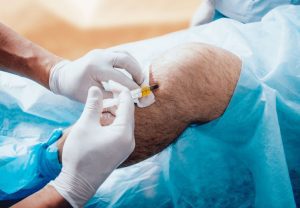What is regenerative medicine? It is the restoration of diseased, defective, or worn tissues and organs of the human body. Regenerative medicine is based on the replacement or repair of damaged cells or organs (by accident, disease, or aging) with healthy and fully functional cells. This is a procedure that can be done by experts.
A perfect example of this medical procedure is when you break your arm. It repairs itself. Medical experts just promote its repair by immobilizing it in a plaster cast, just as if you wound your arm, there will be a scab, and new skin will appear.
This is to illustrate to you that we all have regenerative capacities at all ages. Our techniques are only there to stimulate your own ability to repair yourself. These techniques are natural and safe, with a decline of more than ten years now.
to you that we all have regenerative capacities at all ages. Our techniques are only there to stimulate your own ability to repair yourself. These techniques are natural and safe, with a decline of more than ten years now.
The Power of Stem Cells
Regenerative medicine is based on the use of pluripotent stem cells. These are cells capable of giving rise to different types of specialized cells (which can repair damaged or diseased tissue), through a process called differentiation.
Stem cells can give rise to different types of cells: blood cells, and also eye cells, heart muscle cells, neurological cells, cartilage cells, and others. Stem cells are located in many tissues (fatty tissue, bone marrow, periosteum, peripheral blood, etc.). We are working to recover as many stem cells as possible through our different techniques.
Future Medicine
We are entering a new era of medicine where we are no longer going to treat people with drugs, which have many constraints but especially side effects. We treat people with their own cells, autologous biotherapy, with perfect tolerance, no side effects known to date, and with almost unlimited potential.
What Diseases Are Affected?
Regenerative medicine (or cell therapy) has been widely used in hematology for several years, particularly in transplantation protocols that aim to treat blood cancers. It can cure several types of cancer: leukemia, lymphoma, breast cancer, myeloma, lung cancer, melanoma, testicular cancer, kidney cancer, and others;
It has recently been used in research to treat heart disease: infarction, heart failure; neurological disorders: Parkinson’s disease, Alzheimer’s disease, cerebrovascular accidents, trauma to the spinal cord; eye diseases: macular degeneration, glaucoma, corneal abnormalities;
been used in research to treat heart disease: infarction, heart failure; neurological disorders: Parkinson’s disease, Alzheimer’s disease, cerebrovascular accidents, trauma to the spinal cord; eye diseases: macular degeneration, glaucoma, corneal abnormalities;
Regenerative medicine is currently the subject of numerous studies. At maturity, this medicine aims to cure patients and allow them to limit their drug needs. Hope for a cure will be reborn for diseases that are incurable today.



Comments are closed.